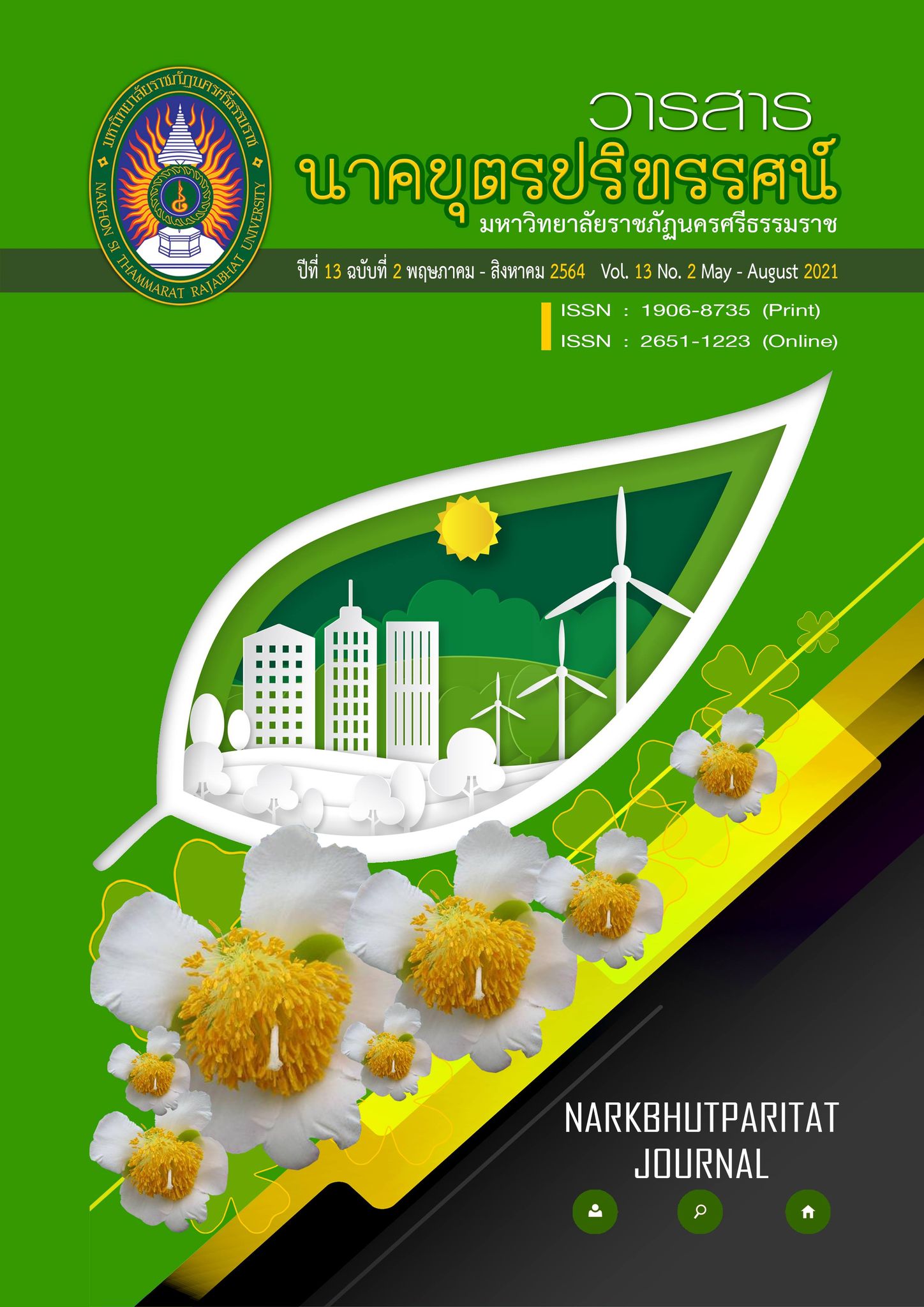ปัจจัยที่มีความสัมพันธ์กับพฤติกรรมการสูบบุหรี่ของวัยรุ่นนอกระบบการศึกษา จังหวัดตรัง
Main Article Content
บทคัดย่อ
การวิจัยเชิงบรรยายนี้ เพื่อศึกษาปัจจัยที่มีความสัมพันธ์กับพฤติกรรมการสูบบุหรี่ของวัยรุ่นนอกระบบ การศึกษา จังหวัดตรัง กลุ่มตัวอย่างเป็นวัยรุ่นที่ศึกษาอยู่ที่การศึกษานอกระบบ (กศน.) ในจังหวัดตรัง จำนวน 100 คน เก็บข้อมูลโดยใช้แบบสอบถามพฤติกรรมการสูบบุหรี่ของวัยรุ่นนอกระบบการศึกษา จังหวัดตรัง วิเคราะห์ข้อมูลโดยใช้สถิติพรรณนา สถิติไคสแควร์ และสัมประสิทธิ์สหสัมพันธ์ของเพียร์สัน ผลการวิจัยพบว่า กลุ่มตัวอย่างส่วนใหญ่เป็นเพศชายจำนวน 83 คน คิดเป็นร้อยละ 83.0 เพศหญิง จำนวน 17 คน คิดเป็นร้อยละ 17.0 กลุ่มตัวอย่างส่วนใหญ่ อายุ 16-18 ปี จำนวน 57 คน คิดเป็นร้อยละ 57.0 และ กำลังศึกษาอยู่ระดับชั้นมัธยมศึกษาปีที่ 1 จำนวน 35 คน
คิดเป็นร้อยละ 35.0 กลุ่มตัวอย่างส่วนใหญ่เริ่มสูบบุหรี่ครั้งแรกเมื่ออายุ 13 ปี จำนวน 40 คน คิดเป็นร้อยละ 40.0 รองลงมาคืออายุ 12 ปี จำนวน 14 คน คิดเป็นร้อยละ 14.0 และยังพบว่ากลุ่มตัวอย่างเริ่มสูบบุหรี่ครั้งแรกเมื่ออายุ 9 ปี จำนวน 2 คน คิดเป็น ร้อยละ 2.0 สาเหตุที่อยากสูบบุหรี่เพราะอยากลองมากที่สุด ปัจจุบันยังไม่เลิกสูบบุหรี่ ปัจจัยที่มีความสัมพันธ์กับพฤติกรรมการสูบบุหรี่ของวัยรุ่นนอกระบบการศึกษา จังหวัดตรัง พบว่าอายุและรายได้
มีความสัมพันธ์กับพฤติกรรมการสูบบุหรี่ของวัยรุ่นนอกระบบการศึกษา จังหวัดตรัง อย่างมีนัยสำคัญทางสถิติที่ .05 และด้านทัศนคติต่อการสูบบุหรี่ มีความสัมพันธ์ทางบวกกับพฤติกรรมการสูบบุหรี่ของวัยรุ่นตอนต้น นอกระบบการศึกษา จังหวัดตรัง อย่างมีนัยสำคัญทางสถิติที่ระดับ .05 (r=0.848) และปัจจัยภายนอกด้านอิทธิพลจากสื่อ และการถูกชักจูงจากบุคคลอื่นให้สูบบุหรี่ มีความสัมพันธ์ทางบวกกับพฤติกรรมการสูบบุหรี่ของวัยรุ่นตอนต้น นอกระบบการศึกษา จังหวัดตรัง อย่างมีนัยสำคัญทางสถิติที่ระดับ .05 (p < .05) (r=0.913 ,0.831 ตามลำดับ)
Article Details
เอกสารอ้างอิง
Aingkapakon, A. (2014). Knowledge, Attitude and Smoking Behavior of Male Students Bachelor
degree Kasetsart University, Bang Khen Campus. (Master of Education Thesis).
Kasetsart University. Faculty of Education, Program in Health Education. (in Thai)
Boonnarakon, S. (2013). Health Promotion. Songkla: Tem printing. (in Thai)
Chaikoolvatana, C., Sutti, P. & Jaimalai, W. (2017).Smoking Behavior and Risk Factors Associated
with Smoking of Early Adolescents in Phayao Province, Thailand.Nursing Journal of the Ministry of Public Health, 27(3), 57-67. (in Thai)
Department of Health. (2011). Impact of tobacco control policy in Thailand Teenager Round
Retrieved 2018, January 10, from http://www.ashthailand.or.th/th/data_center
_page.php?id=505 (in Thai)
Flay, B. R & Petraitis, J. (1994). The Theory of Triadic Influence: A New Theory of health Behavior
with Implication for Prevention Interventions. Advances in Medical Sociology, 4, 19-44.
Flay, B. R., Petraitis, J., & Hu, F. B. (1999). Psychosocial risk and protective factors for adolescent
tobacco use. Nicotine & Tobacco Research, 1, 59-65.
Hair, J. F., Black, W. C., Babin, B. J. & Anderson, R. E. (2010). Multivariate data analysis: A global
perspective. Upper Saddle River, NJ: Pearson.
Kongvattananon, P. (2017). Late Adolescent Females’ Smoking Experiences: A Case Study of
Health Science Students in a University. The Journal of Faculty of Nursing
Burapha University, 25(2), 9-18. (in Thai)
Kulsolkookiet, R. (2016). Using Social Media To Modify Smoking Behavier: Study
Application Line. (Master of Science Thesis). Thammasat University.Faculty of
Commerce and Accountancy. Program in Management Information Systems. (in Thai)
National Statistical Office. (2013). The smoking and drinking behavior survey 2013. Bangkok:
Text and Journal Publication. (in Thai)
National Statistical Office. (2013). Smoking rates by region 1991-2013. Retrieved 2017, February
, from https://www.nso.go.th.
Regional Health 12. (2018). General information of Regional Health 12. Retrieved 2018, January
, from http://www.rh12.moph.go.th/info_rh12/
Rodkanpai, T. & Boonkumnerd, S. ( 2017). Social Immunization for at-Risk Youth : Case Study of
Student in Kuantong Sub-District Non-Formal Education. Khanom District, Nakhon
Si Thammarat Province. Narkbhut Paritat Journal, 9(2), 132-140. (in Thai)
The Office of Non-Formal and Informal EducationTrang Province. ( 2018 ).Fiscal Year 2017
Performance Report. Retrieved February 4, 2017.from http://www.nfe.go.th. ( In Thai)
Voraaroon, O., Khajornchaikul, P. & Prutipinyo, C. (2017). Factors Related to Smoking Self-Control
Among Lower Secondary School Students, Suphanburi Province. The Public Health
Journal of Burapha University, 12(2), 75-85. (in Thai)


